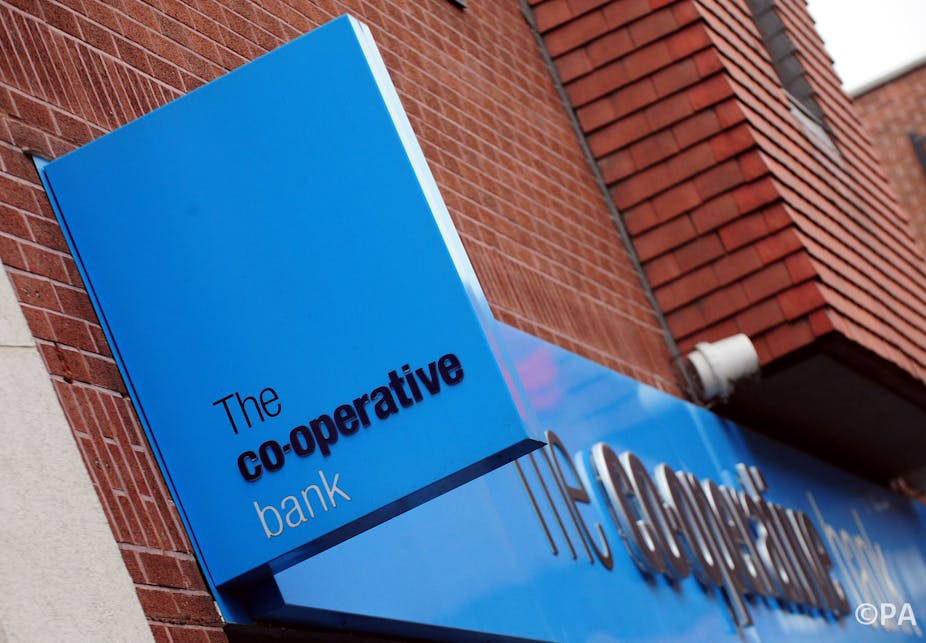Collapsing business deals, massive financial losses, and a “junk” rating have made recent months a nightmare for the Co-op Bank.
In March it announced losses of £634m for the 2012 financial year, largely as a result of acquiring a large package of overvalued mortgages. In April it suddenly pulled out of a deal with Lloyds to buy 632 of its branches. Then on May 10 the American ratings agency Moody’s announced a staggering six notch downgrade in the bank’s credit rating, taking its bonds down from “investment grade” to “junk” status. The Chief Executive, Barry Tootell resigned.
The founders of modern co-operatives could never have imagined that the banking arm of the movement would get into such a financial mess.
An ethical brand
The Co-op Bank was established in 1872 by the Co-operative Group. The Group is a mutual organisation owned by its members, and it remains the Bank’s sole shareholder today.
For more 100 years the Co-op Bank had a low profile, relative to the major high street banks and large building societies. The Co-op established an ethical brand, which made it stand out from other financial institutions. It still refuses to invest in businesses that supply arms to oppressive regimes, or businesses that extract fossil fuels, among other objections.
Rule, Britannia?
But in recent years the bank became increasingly ambitious and expansionary.
This was most vividly demonstrated when it took over the Britannia Building Society in 2009. At that time, Britannia was the second biggest building society in the UK. The business plan was to build a mutual bank that could start to take on the plc banks like HSBC and Barclays. This strategy found favour with many commentators and politicians who, in the wake of the 2007/08 financial crisis, were keen to have more competition in the financial services market and to see ethical banking succeed.
The next move in the Co-op Bank’s expansion plans came in 2012 with the attempt to purchase the Lloyd’s branches.
The terms made it seem that the Co-op Bank had carved out a great deal. £350m was to be paid upfront with up to another £400m to be paid subject to the performance of the enlarged Co-op. This was far less than the £1.5 billion that had originally been expected from the sale of the branches.
Then the business plan started to unravel.
Loans inherited from the Britannia Building Society in 2009 – including commercial and buy-to-let loans - were found to be of poor quality. When the loans portfolio was assessed accurately the Co-op lost £469m in value, plunging the bank into a huge loss for 2012.
Critically, this loss reduced the bank’s store of capital and left it too weak to absorb the costs of the Lloyds branches – hence the deal’s failure.
Moody’s blues
The ratings reduction by Moody’s makes it considerably harder for the bank to raise funds and recover its losses. As long as Co-op remains junk-rated, other banks will be worried about its ability to pay back any loans it takes out. This translates to higher interest rates for the Co-op, and less money available in capital markets.
Consequently the bank has embarked on a fire sale of assets, aimed at raising £800m. Without this money the Co-op may struggle to meet the new EU requirements for banks laid down by the Basel 3 capital regulations.
This remedial strategy is in doubt, though, with some analysts estimating that the Co-op will achieve much less than the £800m hoped for from the sale.
Being a mutual closes off one other obvious money raising option. Plc banks have the ability to issue further shares to ease financial difficulties, as Lloyds did in 2009.
The future’s still mutual?
So what are the prospects for the Co-op Bank? One saving grace is that banking represents only one part of the larger Co-operative Group. The group as a whole has solid financial strengths and sound businesses, including retailing and funeral services.
This financial strength could be drawn on to support the bank. An alternative outcome would be for the Co-operative Group to get out of banking and dispose of this arm of its business.
The Co-op’s current difficulties do not mean that mutuals are unable to compete with the big City banks. As Nationwide Building Society demonstrates, a well run mutual can offer a viable alternative to the likes of Barclays, HSBC and the other high street plc banks.
The Co-op Bank’s problems are not another manifestation of the failures of “casino banking”.
It tried to expand too quickly, and it took over an organisation without properly considering the value of the purchase. These are mistakes any business can make.
The Co-op’s ethical culture may have saved it from the more outrageous excesses of mid-00s banking. However, its problems arose from much more prosaic failings of overambition and lack of oversight.

